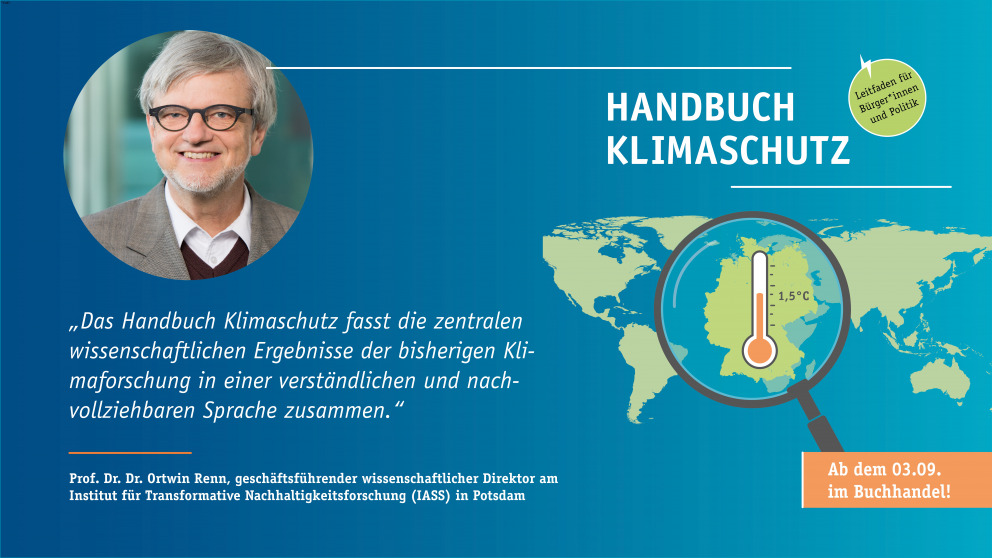Knowledge for Action
04.09.2020
The precise form a climate-neutral society should take and the pathways that will lead us to that goal are questions not just for scientists and politicians, but for the whole of society. Citizens must be involved in the transition to climate neutrality. A new handbook on climate protection (Handbuch Klimaschutz) condenses the findings of around 300 scientific studies and provides a sound basis for a future citizens assembly for climate protection.

The Covid-19 pandemic upturned people’s lives across the globe in the space of just a few weeks. Climate protection also has to lead to drastic changes in the way we live if we are to stay within the 1.5-degree limit set by the Paris Agreement. If the consequences of climate change are to remain remotely controllable, the transformations to our society must happen much faster and on a much larger scale than hitherto discussed. The ultimate aim is climate neutrality.
That means reducing harmful greenhouse gas emissions to the point where they are completely avoided or compensated for in a climate-neutral society. But the precise form a climate-neutral society should take and the pathways that will lead us to that goal are questions not just for scientists and politicians, but for the whole of society. Citizens must be involved in the transition to climate neutrality – this is the fundamental premise of a new Handbook on Climate Protection (Handbuch Klimaschutz) that was produced in cooperation with the association Mehr Demokratie and the Bürgerbegehren Klimaschutz. Drawing on their analysis of over 300 studies, project leader and author Karl-Martin Hentschel and his team outline different courses of action that will allow Germany achieve its climate goals after all.
Robust knowledge for citizen participation
“The decisions policymakers and society will derive from these scientific insights will not be determined by scientific consensus but by the deliberative democratic process,” writes IASS Director Ortwin Renn in the foreword to the Handbook. “In a thriving democracy, it should be clear that this is not merely down to the representatives of democratically elected bodies. In this case, all citizens are called upon to actively contribute to setting the political course.”
The Handbuch Klimaschutz equips citizens with the knowledge they need to contribute to the mammoth task of climate protection and formulate their wishes in this regard. Concise, readable and well-structured, it shows just how far-reaching the imminent transformation is. Covering aspects from the energy system to planning law and digitalisation, from mobility to industry, agriculture and financing, the Handbook takes a holistic approach without overwhelming readers. After a survey of the present situation and the preconditions for a climate-neutral society, the authors outline the many concrete development pathways that we as a society need to choose between, for example, when deciding on a socially just carbon price. And they formulate clear demands for legislation in certain areas.
A total of seven sectors – energy, heating, transport, industry, agriculture, soils and waste – are covered in individual sections that reflect the broad range of opinions expressed in the studies. The many diagrams and tables provide readers with a quick overview of the various options for each sector currently being discussed by the scientific community. The focus is not only on technical issues, but also on broader societal questions. Take the example of wind energy. Hard data has conclusively shown that wind energy has a very important role to play in the energy transition. But the expansion of wind energy is accompanied by usage and acceptance issues that will also have to be addressed.
A springboard for a citizens' assembly for climate protection
The Handbook is also intended as a neutral and scientifically robust basis for a discussion of a future citizens' assembly for climate protection. It presents a list of issues that could be discussed by such an assembly composed of randomly selected citizens, including practical questions like: “How close would a car-sharing car need to be for you to use it on a regular basis? Would you use it if it came to your door?” As well as more political questions: “Should power networks be renationalised (transferred from private to municipal ownership)?”
The issue of sufficiency is also raised. As Hentschel writes, most studies focus on technical solutions as a means of achieving climate neutrality. In a democracy, it’s simply not feasible to prescribe lifestyle changes. “That’s why in this book we focus more on efficiency measures. That said, the issue of sufficiency also warrants more intense discussion by a citizens' assembly.” The book nevertheless raises a lot of questions about our lifestyle and gives tips for how to live a more climate friendly life.
Readers who want to immerse themselves more in the subject can find plenty of extra material and informative tables, as well as links to over 500 sources, on the handbook website: www.handbuch-klimaschutz.de. This additional material also provides insights into how the findings of the handbook were arrived at.
More information:
